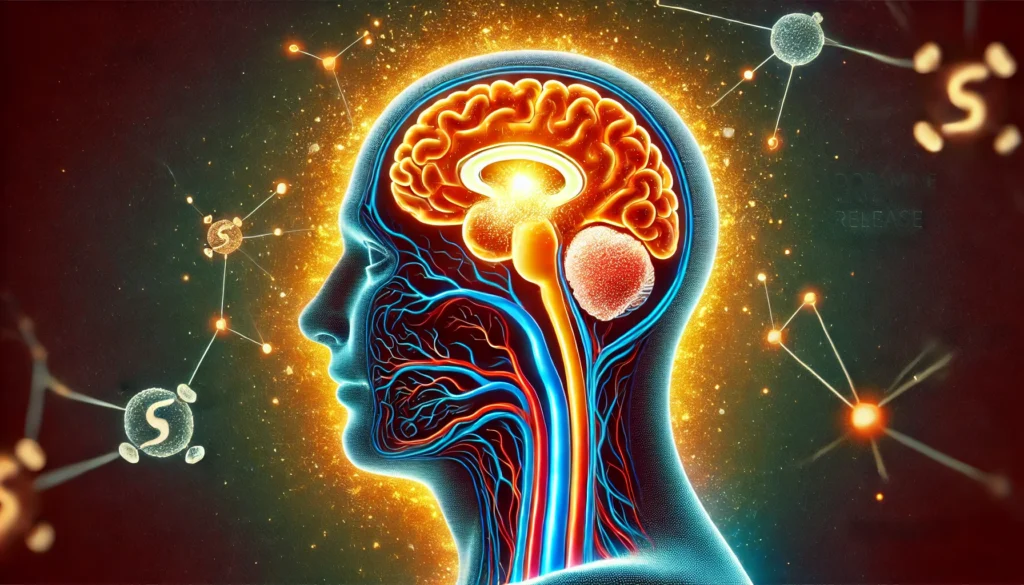Understanding the Link Between Sugar and Stress
Stress is an inevitable part of life, but how we manage it can significantly impact our well-being. Many people instinctively reach for sugary treats when under pressure, a behavior that seems almost universal. But why does sugar make me feel less stressed the next day? Is there a genuine biological basis for this effect, or is it merely psychological? Neuroscience offers compelling insights into the relationship between sugar consumption and stress relief. Research suggests that sugar interacts with brain chemistry in ways that temporarily alleviate stress, but the long-term consequences are more complex. Understanding how sugar helps with stress requires examining its impact on neurobiology, metabolism, and emotional regulation.
You may also like: How Diabetes Affects the Brain: Understanding Brain Fog, Memory Loss, and Mental Confusion from High Blood Sugar
The Role of Sugar in Brain Chemistry and Mood Regulation
The brain relies heavily on glucose as its primary energy source. When stress levels rise, the body experiences increased metabolic demands, particularly in the brain, which requires a steady supply of glucose to function optimally. Consuming sugar provides an immediate energy boost, which may explain the rapid relief many feel after indulging in something sweet. This phenomenon is largely due to the way sugar influences neurotransmitters such as serotonin and dopamine, which are critical for mood regulation.
Dopamine, often referred to as the “feel-good” neurotransmitter, is released in response to pleasurable activities, including eating sugar. The immediate sense of reward that follows sugar consumption reinforces the habit, making it a common coping mechanism for stress. Additionally, serotonin, which helps regulate mood and anxiety, is indirectly affected by sugar intake. Carbohydrates, including sugar, promote the production of tryptophan, a precursor to serotonin. This connection explains why sugar makes me feel less depressed when facing stressful situations. However, frequent reliance on sugar to boost mood may create a cycle of dependence that leads to long-term issues.

How Sugar Modulates the Stress Response
The stress response is primarily governed by the hypothalamic-pituitary-adrenal (HPA) axis, which controls cortisol production. Studies indicate that sugar consumption can blunt the stress response by reducing cortisol levels. This effect suggests that sugar may provide short-term relief from stress-induced physiological reactions. However, chronic sugar intake can disrupt normal HPA axis function, leading to dysregulated cortisol levels over time.
When cortisol levels remain elevated due to chronic stress, the body may develop insulin resistance, contributing to metabolic imbalances. Although sugar helps with stress in the moment, excessive intake can lead to an increased risk of anxiety and depression due to fluctuations in blood sugar levels. The temporary relief provided by sugar may come at the cost of long-term stress sensitivity, making individuals more susceptible to mood disorders.
The Relationship Between Sugar and Emotional Eating
Emotional eating is a common response to stress, with sugar-rich foods often being the go-to comfort choice. This behavior is reinforced by the brain’s reward system, which associates sugar with positive emotional experiences. People who frequently turn to sugar when stressed may be engaging in a conditioned response, reinforcing the habit each time stress arises.
Research has found that sugar consumption triggers opioid receptors in the brain, producing effects similar to those seen with addictive substances. This reinforcement cycle can make breaking free from sugar dependency difficult, particularly for individuals who have developed a habitual reliance on sweet foods for stress management. The question remains: does sugar help you cope with stress in a sustainable way, or does it create a dependence that ultimately exacerbates emotional distress?
Sugar and the Gut-Brain Connection in Stress Management
Recent research highlights the critical role of the gut-brain axis in mood regulation. The gut microbiome influences neurotransmitter production, particularly serotonin, which is heavily linked to stress and emotional well-being. High sugar intake can disrupt the balance of beneficial gut bacteria, leading to inflammation and altered brain chemistry.
Diets rich in added sugars have been associated with increased levels of gut dysbiosis, which can contribute to anxiety and depression. While sugar makes me feel less stressed the next day, its long-term effects on gut health may contribute to heightened stress sensitivity over time. Ensuring a diet rich in fiber, probiotics, and nutrient-dense foods may help mitigate these effects, supporting overall stress resilience.
The Long-Term Consequences of Sugar on Mental Health
While sugar provides immediate comfort, its long-term effects on mental health are concerning. Regular sugar consumption has been linked to an increased risk of depression, anxiety, and cognitive decline. High sugar diets contribute to chronic inflammation, insulin resistance, and oxidative stress, all of which can negatively impact brain function.
The paradox of sugar consumption is that while it may temporarily relieve stress, it can ultimately exacerbate mood disorders. The cycle of blood sugar spikes and crashes leads to irritability, fatigue, and mood instability, which may worsen stress symptoms over time. Understanding why sugar leads to depression in some individuals highlights the importance of moderation and alternative stress management strategies.
Finding Healthier Alternatives for Stress Management
Given the complex relationship between sugar and stress, adopting healthier coping mechanisms is essential. Instead of relying on sugar for relief, consider incorporating the following stress management techniques:
- Balanced Nutrition: Consuming complex carbohydrates, lean proteins, and healthy fats supports stable blood sugar levels and promotes sustained energy.
- Physical Activity: Exercise stimulates endorphin release, reducing stress naturally and improving overall mood.
- Mindfulness Practices: Techniques such as meditation, deep breathing, and progressive muscle relaxation can help regulate stress responses.
- Social Connection: Engaging with supportive social networks provides emotional relief and reduces reliance on food for comfort.

Frequently Asked Questions (FAQ): Sugar, Stress, and Depression
1. Why do some people say sugar helps with stress, even when it’s not a long-term solution?
Many people claim that sugar helps with stress because of its short-term ability to trigger dopamine release and blunt cortisol spikes. While the body does momentarily interpret sugar as comforting, this effect is temporary and not a sustainable stress management strategy. Anecdotally, individuals often report that sugar makes them feel less stressed the next day, especially after emotionally taxing events. This could be due to the brain’s positive association between sugar and comfort, which can psychologically reinforce a sense of stability. However, relying on sugar as a coping mechanism may backfire in the long run by increasing inflammation and dysregulating mood.
2. How does sugar affect brain chemistry in relation to stress and mood?
Sugar consumption influences neurotransmitters like serotonin and dopamine, which can explain why sugar helps with stress on a biochemical level—at least briefly. The sensation that “sugar makes me feel less stressed the next day” is linked to these neurotransmitters offering temporary mood elevation. However, this creates a feedback loop where sugar is continually sought for emotional regulation. While this might explain why sugar makes people feel less depressed in the moment, consistent sugar use as an emotional buffer can dull the brain’s natural reward system, potentially exacerbating underlying stress. It’s important to recognize the difference between short-term relief and long-term resilience.
3. Is there scientific evidence supporting the idea that sugar makes me feel less stressed the next day?
Emerging studies in neuropsychology suggest a short-term mood lift following sugar intake, but this doesn’t necessarily confirm that sugar makes you feel less stressed the next day across the board. Individual responses vary due to hormonal balance, insulin sensitivity, and mental health history. Some people may interpret the calming effect post-sugar as evidence that sugar helps with stress, but this perception might reflect psychological conditioning more than physiological benefit. For those wondering, “does sugar help you cope with stress?”, the answer is complicated—sugar may offer transient calm but rarely addresses the root cause of stress. Furthermore, chronic sugar use may ultimately destabilize mood regulation pathways.
4. Can sugar have antidepressant-like effects in certain situations?
In acute, low-stress situations, sugar can momentarily reduce anxiety symptoms, which may be why some individuals report that sugar makes them feel less depressed. The brain interprets high-sugar foods as pleasurable, mimicking the neurochemical patterns seen with some antidepressant medications. This might contribute to why people believe sugar helps with stress or even why sugar makes them feel less stressed the next day. However, such effects are fleeting and not a substitute for clinical treatment. Ironically, as sugar leads to depression over time—especially with high intake—the perceived benefit becomes part of a harmful cycle rather than a healthy coping mechanism.
5. Why does sugar make me feel less depressed after emotionally draining days?
This question often arises when people experience temporary relief from sadness or anxiety after eating sugary food. This reaction is partly neurological—sugar elevates dopamine and serotonin—but also psychological, as sugar may be tied to comforting memories. The idea that sugar helps with stress is rooted in these short-term neurochemical responses. Many report that sugar makes them feel less stressed the next day after a stressful event, possibly because it temporarily improved sleep quality or reduced anxiety the evening prior. However, repeated use of sugar for mood regulation can weaken the body’s resilience and lead to emotional dependence.
6. Could the belief that sugar makes me feel less stressed the next day be placebo-based?
Absolutely. The expectation that sugar will calm you can trigger a placebo effect, leading you to genuinely feel more relaxed the following day. This may reinforce the narrative that sugar helps with stress, even when no significant biochemical changes occur. It’s also possible that comfort foods, in general, provide emotional reassurance, which is mistaken for physiological stress relief. People often ask, “does sugar help you cope with stress?” without considering the power of belief and context. Over time, these perceived benefits may become self-fulfilling—even if sugar leads to depression when used excessively.
7. What are the risks of using sugar as a coping mechanism for emotional stress?
While sugar may offer short-lived relief—leading many to think sugar helps with stress—the long-term risks are significant. Chronically high sugar intake contributes to insulin resistance, inflammation, and disrupted mood regulation. Even if sugar makes you feel less stressed the next day occasionally, over-reliance can hinder emotional growth and lead to compulsive eating behaviors. Furthermore, mounting evidence suggests that excessive sugar leads to depression by depleting nutrients vital for mood stability. It’s important to develop coping strategies that don’t rely on dietary sugar, such as physical activity, mindfulness, or professional therapy.
8. How does the cycle of stress and sugar impact mental health over time?
When people habitually turn to sugar after emotional upheaval, they may temporarily believe sugar helps with stress. The pattern might be reinforced if sugar makes them feel less stressed the next day. However, the biological cost of this cycle includes cortisol dysregulation, neurotransmitter imbalance, and increased systemic inflammation. Over time, the risk that sugar leads to depression rises, especially when combined with poor sleep and sedentary habits. This creates a false dependency where sugar becomes the go-to solution, crowding out healthier emotional resilience tools.
9. Is there a psychological explanation for why sugar makes me feel less stressed the next day?
Yes. The association between sugar and emotional reward starts early in life—often linked to celebrations, rewards, or comforting experiences. As adults, we unconsciously revert to sugar in times of stress, reinforcing the belief that sugar helps with stress. Even if the physiological benefits are minimal, the emotional familiarity can feel profoundly soothing, which is why sugar makes some people feel less stressed the next day. However, this comfort often masks unresolved emotional strain, and if unchecked, the pattern can escalate until sugar leads to depression. Recognizing this dynamic is key to developing healthier emotional responses.
10. What are healthier alternatives for coping with stress without relying on sugar?
Instead of asking “does sugar help you cope with stress?”, consider reframing the question toward sustainable stress relief. Activities like breathwork, journaling, or progressive muscle relaxation provide emotional relief without the biological drawbacks. While it might feel like sugar helps with stress—especially when sugar makes you feel less stressed the next day—these effects are short-lived. The danger lies in believing that sugar offers consistent relief, which can lead to a cycle where sugar leads to depression. Fostering a toolbox of healthy coping mechanisms can provide lasting benefits without the crash that often follows sugary indulgence.

Conclusion: Understanding the Sweet Relief Effect
The neuroscience behind sugar’s stress-relieving effects is both fascinating and complex. While sugar helps with stress in the short term by influencing neurotransmitter activity and blunting cortisol release, its long-term effects may be detrimental. Chronic sugar consumption can contribute to emotional eating patterns, gut dysbiosis, and increased susceptibility to anxiety and depression.
Understanding why sugar makes me feel less depressed requires a nuanced approach that considers both its immediate impact and potential long-term consequences. Moderation is key, and seeking alternative stress management strategies can promote overall well-being without the risks associated with excessive sugar consumption. As research continues to uncover the intricate links between diet and mental health, individuals can make more informed choices about their approach to stress relief, ensuring that their habits support long-term resilience rather than contributing to cycles of dependency and mood instability.
neuroscience of sugar and stress, emotional eating and sugar, stress response and sugar consumption, gut-brain connection and stress, sugar cravings and mood regulation, cortisol and sugar intake, sugar addiction and stress relief, blood sugar levels and mental health, HPA axis and sugar consumption, serotonin and sugar cravings, sugar consumption and anxiety, insulin resistance and mood swings, sugar intake and depression risk, stress resilience and dietary choices, neurobiology of sugar addiction, metabolic health and emotional regulation, chronic stress and blood sugar, impact of sugar on cognitive function, dopamine and sugar cravings, sugar withdrawal and emotional distress
Further Reading:
Sweet Emotions: The Complex Relationship Between Sugar and Mental Well-Being
Disclaimer: The content published on Better Nutrition News (https://betternutritionnews.com) is for informational and educational purposes only. It is not intended as a substitute for professional medical advice, diagnosis, or treatment. Always seek the guidance of a qualified healthcare professional before making any changes to your diet, nutrition, or wellness practices. The opinions expressed by authors and contributors are their own and do not necessarily reflect those of Better Nutrition News.
Better Nutrition News and its affiliates make no representations or warranties regarding the accuracy, completeness, or reliability of the information provided. We disclaim all liability for any loss, injury, or damage resulting from the use or reliance on the content published on this site. External links are provided for reference purposes only and do not imply endorsement.



